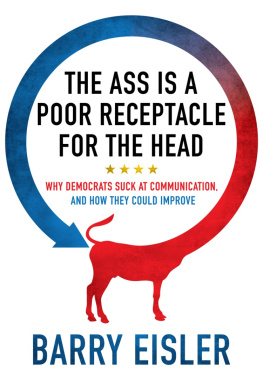
Regardless of what you think of their policies, the sad truth is that Democrats suck at selling their ideas to the public. In this hilarious and hard-hitting essay, best-selling novelist and political blogger Barry Eisler draws on his expertise in narrative, his CIA training in persuasion, his time as an international intellectual property lawyer, and his background in technology marketing to offer Democrats some sound advice on how to improve their communications strategy. Borrowing principles from judo and boxing; using examples from advertising, movies, plays, speeches, and debates; and offering case studies of actual policy rollout successes and disasters, Eisler encourages Democrats to force Republicans to fight on Democratic terms, to use Republicans' own moves against them, and to not just slip a punch, but to hammer their opponents into a rhetorical corner and knock them the hell out.
Note: several of the links in this essay are to videos, which wont display on all digital readers, but which ought to look fine if you view the document on your computer.

After graduating from Cornell Law School, Barry Eisler spent three years in a covert position in the CIA not a bad start for a future thriller writer. After leaving the Agency, Eisler put his law degree to use, dividing his time between Washington, D.C., Silicon Valley, and Tokyo, first as a lawyer, then as a technology startup executive. Along the way, he earned his black belt from the Kodokan International Judo Center and started writing a novel, Rain Fall, that was published in 2002 to critical acclaim in over 20 countries and enabled him to write full time. Since then, Eisler has written a total of eight books, one screenplay, and a lot of blog posts. It was his discovery of the blogosphere, in fact, that led to Eisler's deepening politicization, and his latest novel, Inside Out, a thriller built on Guantanamo, Blackwater, and the missing CIA interrogation videos, is his most political yet, praised by former soldiers and spooks like Matthew Alexander and Robert Baer; journalists like Daphne Eviatar and Dahlia Lithwick; filmmakers like Charles Ferguson and Alex Gibney; and bloggers like Glenn Greenwald and Jeremy Scahill.
To stay in touch with Barry, sign up for his newsletter. Its a private list and your email address will never be shared with anyone else. The newsletter is also a great way to be the first to learn about movie news, appearances, and other books and stories. You can also find Barry on his website, his blog Heart of the Matter, Facebook, and Twitter.
There are really only two explanations for the ineffectiveness of the Democratic party in implementing its purported agenda. Either Democrats are trying to sell terrible products, or Democrats are, whether deliberately or negligently, terrible at sales.
Generally speaking, I dont think the explanation is the quality of the product. Universal subsidized health insurance, for example, ought to be popularand in fact it is, both elsewhere in the world and even in America, where a more limited version is known as Medicare. Its also instructive to consider Democratic fecklessness in ending American involvement in Afghanistan and Iraq, given that polls consistently show a majority of Americans want America to withdraw. An inability to sell something people demonstrably want to buy strongly suggests the problem lies not with whats being sold, but rather with the seller.
But even if it were true that Democratic products were intrinsically unappealing, Democratic sales attempts so often violate fundamental principles of effective selling that the attempts can be judged unworthy even irrespective of the results they consistently fail to produce. In other words, no matter the quality of the product, Democrats could sell more of it if they would improve their sales game.
That improvement needs to start with sound advice, something in short supply today in the Democratic establishment. For a taste, have a look at this Washington Post op-ed by Patrick Caddell and Douglas Schoen, in which these two wise Democratic mandarins advise Obama that the ideal way to isolate the right would be to announce he wont run for a second term.
(And dont miss David Weigels hilarious Slate parody of Caddells and Schoens utterly serious proposal, though theres almost no way to distinguish here between the parody and the real thing.)
In interpreting events, I try to keep in mind the maxim, Never attribute to malice what can adequately be explained by stupidity. Even so, Democratic communication ineptitude is of such frequency and magnitude that it strains ones capacity for generous interpretations. Still, in the perhaps forlorn hope that Democratic communication feebleness is indeed the result of gross negligence and not of sinister cynicism, Ill offer some pointers Democrats might usefully consider if theyre serious about governing.

The electorate is like a convention attendee who skips the panels and just glances at the program booklet. So if the program consists of panels like, Do Democrats Want to Build a Ground Zero Mosque? and Are Democrats Socialists? and Will Democrats Implement Death Panels? and Do Democrats Want to Read Terrorists Their Miranda Rights? and Do Democrats Know Were at War? and Are Democrats Making Us Unsafe? etc., it doesnt matter what happens on the panels themselves. Attendees will be swayed largely just by the headline topics.
The surest way to prevent the other side from imposing its topic agenda is to impose your own first, and the failure to do so constitutes the communications original sin of the Obama administration. Obama, who seems wedded to a belief that goodwill and tone are ends rather than means, never used the Bush administrations disastrous economic and national security record against Republicans, and into the resulting communications vacuum Republicans were able to push all the topics enumerated in the paragraph above, and more.
The problem with letting your opponent choose the topic is that doing so makes it almost impossible to win. If theres enough argument over whether Obama is a socialist, there must be something to ithe must be at least partly a socialist. The audiencethat is, the electoratedoesnt remember, and isnt moved by, the details; what they remember is the topic. Are Democrats soft on terror? Does health care reform mean death panels? If the question dominates, the answer is largely irrelevant. When you allow your opponent to choose the topic, it doesnt matter how good your argument isyou cannot win the debate.
Next page















